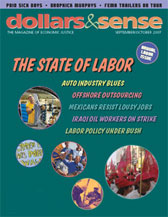Letter to the Editors
This article is from the September/October 2007 issue of Dollars & Sense: The Magazine of Economic Justice available at http://www.dollarsandsense.org

This article is from the September/October 2007 issue of Dollars & Sense magazine.
Subscribe Now
at a 30% discount.
Dear friends,
For the first time since I started reading D&S I find myself in total disagreement with a story—that on Sudan. How could you let yourself be taken in by George Clooney and the State Department? I can't believe it!
Also, whatever would you want to boycott China for? No one ever boycotted U.S. companies trading with neo-imperialist or fascist regimes (admittedly except for a short spell towards the end of the apartheid regime in South Africa). If one followed your logic, that would mean boycotting every company trading with the United States (the imperialist regime par excellence which wages war on another country on average once a year), which means the U.S. economy would have to boycott itself and close down altogether.
Anyway, for your info I enclose a European article on Sudan. Please next time, just stick to what you do best—reporting on economic and social issues in the United States or the American continent.
J.P. Batisse
Reims, France
(The letter-writer included a copy of an article by George Galloway, "The Truth on Sudan," The Morning Star (U.K.), 9/29/06. We would provide a link to the article, but it is available only to paid subscribers of The Morning Star. A google search will help readers find other information about Galloway's views on Darfur, and criticisms of his views.)
The editors respond:
Fidelity Out of Sudan, the focus of the article, does not call for a boycott of China, or even of the Olympics. In fact, no one in the Sudan divestment movement is calling for such boycotts, as a recent press release from a divestment umbrella group makes clear. Instead, activists are pursuing a strategy of "targeted divestment," which focuses on "worst offender" companies—in this case, the Chinese oil companies Petrochina and Sinopec—that provide key financial support for a government involved in massive crimes against humanity. Activists are recommending targeted action, e.g. urging U.S. investment houses such as Fidelity and Berkshire Hathaway to divest from the Chinese oil companies, in order to put pressure on the government of Sudan and also the government of China, which has insulated Khartoum from economic pressure and human rights accountability.
Our article did not discuss larger debates on the left about Darfur. Among left contrarians on Darfur, we find Mahmoud Mamdani to be more credible than George Galloway. In a March 2007 article in the London Review of Books, Mamdani makes at least two important points. First, much of the (often moralistic) rhetoric about Darfur has obscured the historical and political realities of insurgency and counterinsurgency in Sudan; here New York Times columnist Nicholas Kristoff, who has framed his commentaries on Darfur in terms of "human evil," is a main offender. Second, the U.S. media and diplomatic response to violence in Darfur contrasts starkly with the relative silence on the far worse violence in neighboring Congo, partly because it is possible to attribute the violence in Darfur to "Arabs." (A recent article by Glen Ford in the online journal Black Agenda Report makes the same point.) But both Galloway and Mamdani are arguing primarily against U.S. military intervention in Sudan, which our article does not address, which we do not support, and which is not part of the divestment coalition's agenda.
Finally, as with any number of social and economic issues in the United States, U.S. companies' extensive investments in companies financing the conflict in Sudan, along with the growing activism against that investment, is a global as well as domestic matter. We will continue to cover global economic issues—one of our strengths, we think!—and to cover the U.S. economy in global context.
